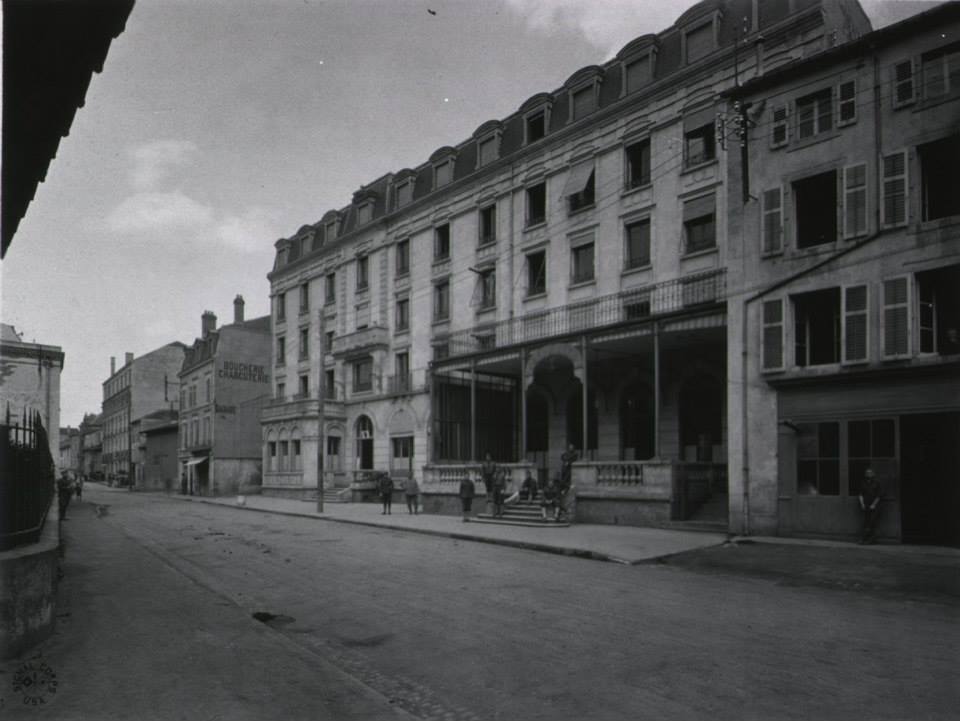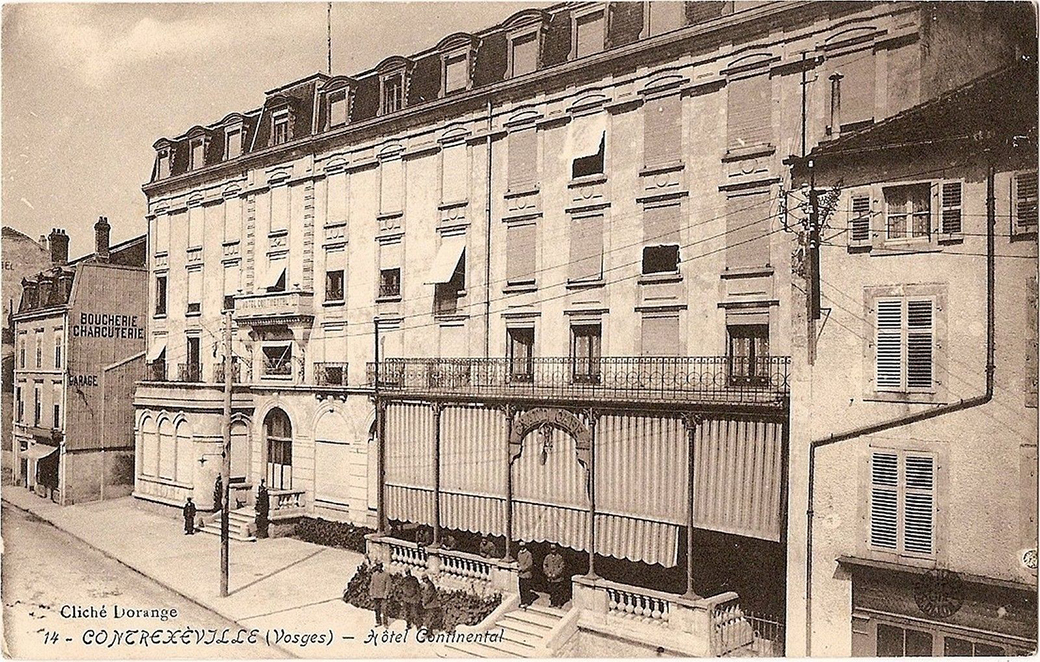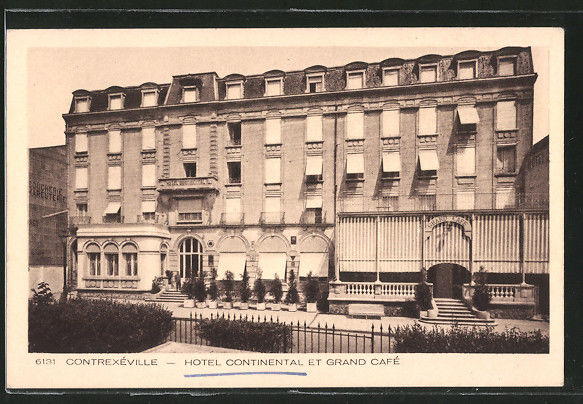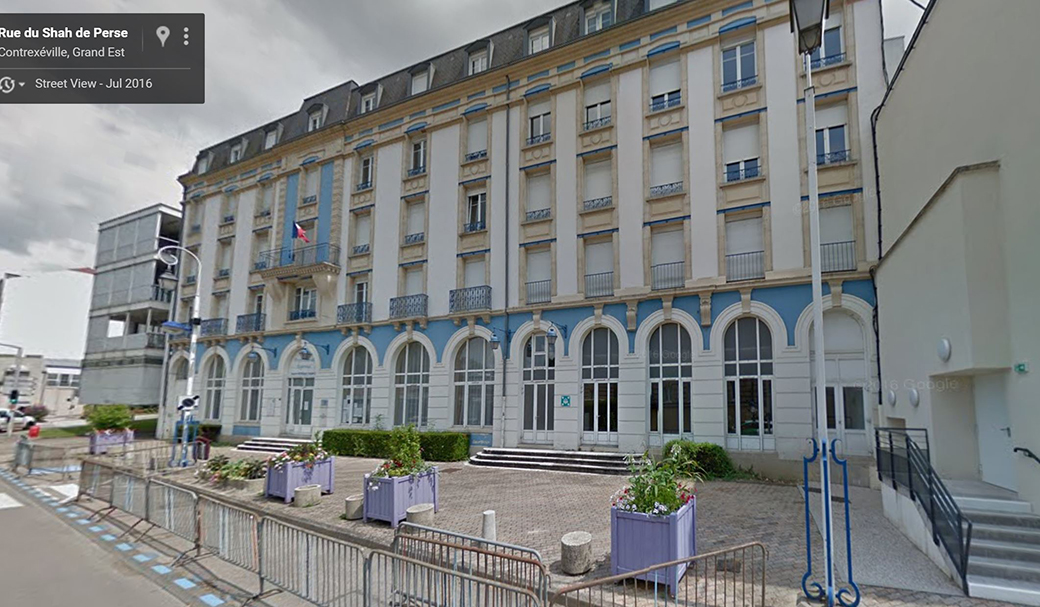Hotel Continental - Hospital No. 4

Hotel Continental (image from the National Library of Medicine)
Source: Kaletzki, Charles Hirsch. Official history USA Base Hospital No. 31 of Youngstown, Ohio: And Unit G of Syracuse University. Syracuse, NY, Craftsman Press, 1919.
Before the arrival of Base Hospital No. 31, Base Hospital No. 32 being first on the scene, exercised its natural option and chose the four hotels in the upper segment of the town, leaving the others, with approximately the same bed capacity, to Base Hospital No. 31. The Hotel Continental, situated on the main street of the village, was the largest of the lower group, being a four-story structure faced with stucco. The lower floor was divided into what had been used as kitchen, dining rooms, grand salon and cafe. The upper floors were made up of rooms of the ordinary French hotel size, accommodating from three to five hospital beds. The building had an independent non-potable water supply. Plumbing facilities were good, in comparison with other French summer resort structures. An independent sewage system consisted of several septic tanks, the overflow from the tanks draining into the River Vair. [Kaletzki, p. 33]
[Besides the central laboratory established in Hotel Harmand], six subsidiary laboratories were established in the following hotels respectively: the Cosmopolitan, the Providence, the Royal, the Martin Aine, the Continental and the Harmand. Enlisted men were trained to do clinical pathology. These men were selected from medical students, pharmacists and prospective medical students. [Kaletzi, p. 159]
Source: Hitz, Benjamin D. A history of Base Hospital 32, including Unit R. Indianapolis, 1922.
Preparations for the reception of Base Hospital 32 on the night of December 25th-26th had been made by Major East of Base Hospital 36, of Detroit. This unit, together with Base Hospital 23, of Buffalo, was already stationed at Vittel, a similar, but somewhat larger summer resort town about five kilometers north of Contrexeville. Temporary quarters had been arranged for and equipped with iron cots and blankets taken over from the French. The first few days at Contrexeville were spent in arranging more comfortable personnel quarters and providing for the mess. Offices were established temporarily in the Hotel Continental, and the Continental kitchens and dining rooms were used until some time after the arrival of Base Hospital 3 I. French rations were provided pending arrangements with the American Quartermaster Corps. [Hitz, p. 47]
The headquarters offices, which had been temporarily established in the Hotel Continental, moved into their permanent location on the second floor of the Moderne Annex, and the enlisted men's mess, which had been served jointly by Base Hospitals 31 and 32 in the Continental dining room, separated and operated independently. Messes for 32's men were established at the Cosmopolitain and Providence, and for the officers' and nurses in their respective quarters. [Hitz, p. 51]

Postcard image of Hotel Continental (image captured from eBay.)

Postcard image of Hotel Continental (image captured from eBay)

Google Maps street view of former Hotel Continental, Contrexeville (today the Lycée Professionel Régional Pierre Mendès France)
Source: My Trip Abroad with Uncle Sam: 1917-1919 (the journal of Maude Frances Essig, nurse from Indiana in Base Hospital 32):
"December 26, 1917 - Wednesday - at 3:00 AM our little train made its last stop or us at Contrexeville la Vosges, France. We were told we could stay on the train until daylight or go to the hotel where we would be given coffee! Needless to say we all piled out, waded through snow to the Continental Hotel where about the coldest reception I ever hope to experience was received. We were told to be seated on benches in a great bare barn of a room where there were some home-made oilcloth covered tables, and a mite of a stove that gave off no heat but a super abundance of smoke, attached to the stove was about 50 ft. of stove pipe that finally ended through a tin pane in one of the windows at the rear of the room. After a considerable wait, two French soldiers appeared with a wash basket full of drinking glasses, later they passed some abominable stuff called coffee. No one could drink it. Then we were told to help ourselves to beds on the floor above. Such a scramble in the dark, Mary Houser and I finally located ourselves in a rear room. We finally got up courage enough to lie down on the miserable cots with more miserable hairy blankets with all our clothes on, ulsters included and finally we got to sleep. Got up about 9 with the sun shining through curtainless windows into my face. We took inventory of the room and found conditions far worse than we thought it could be in the dark. My bed had at sometime been occupied by an incontinent person - the French soldiers we told had vacated the building to make a place for us. Later we went to a cafe for food, after a long wait we had a really good meal, cold ham, pickle, delicious omelet, bread and really hot tea."
Another version of the same event: – from Charlotte Cathcart, Indianapolis From Our Old Corner, Indiana Historical Society, 1965, p. 85.) (Charlotte Cathcart was a civilian member of Base Hospital 32.)
"About three o'clock of the morning of December 26 the train stopped, and sleepy and disheveled we disembarked in two feet of snow. French civilians escorted various groups to their unheated quarters but no one seemed to mind the cold: we were so glad to be off that train. A little station bore the letters 'CONTREXEVILLE.' Somehow the French provided us hot coffee."